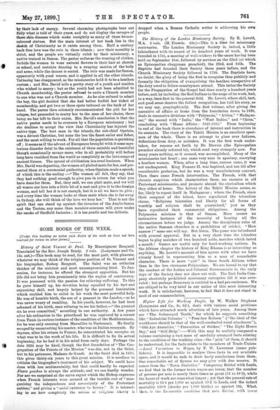SOME BOOKS OF THE WEEK.
[Under this heading we notice such Books of the week as have not been reserved for review in other forms.]
History of Saint Vincent de Paul. By Monseigneur Bougard. Translated by the Rev. Joseph Brady. 2 vols. (Longmans and Co. 16s. net.)—This book may be read, for the most part, with pleasure, whatever we may think of the religious position of St. Vincent and his biographer, Bishop Bougard. The Saint was an orthodox thinker of the strictest and most uncompromising kind. To Jan- senism, for instance, he offered the strongest opposition. But his life did not bring him prominently into the region of controversy. It was possessed with the passion for relieving suffering. To this he gave himself up, his devotion being equalled by his tact and organising skill, and largely helped by the personal fascination which enabled him to enlist in his work the most powerful help. He was of humble birth, the son of a peasant in the Landes,—as he was never weary of recalling. In his youth, however, he had been ashamed of his birth, once refusing to see his father,—" the greatest sin he ever committed," according to one authority. A few years after his ordination to the priesthood he was captured by a corsair from Tunis (a curious instance of the condition of the Mediterranean, for he was only crossing from Marseilles to Narbonne). He finally escaped by reconverting his master, who was an Italian renegade. By degrees, after his return to France, he concentrated his energies on what was to be the work of his life. It is difficult to fix its actual beginning, for he had it in his mind from early days. Perhaps the date 1624 may be fixed, though the first foundation of "The Con- gregation of the Priests of the Mission" was due, not to the Saint, but to his patroness, Madame de Gondi. As the Saint died in 1660, this gives thirty-six years to this great mission. It is needless to criticise the biographer's treatment of his subject. We could have done with less sentimentality, but that could hardly be expected. Plezis genibus is always the attitude, and we can hardly wonder. Nor are we surprised at the naive regret which the Bishop expresses when French interests were secured at the terrible cost of "reor- ganising the independenee and sovereignty of the Protestant nations," and giving a "social existence to heresy." It is interest- ing to see how completely the notion of religious liberty is
dropped when a Roman Catholic writer is addreAng his own people.






































 Previous page
Previous page